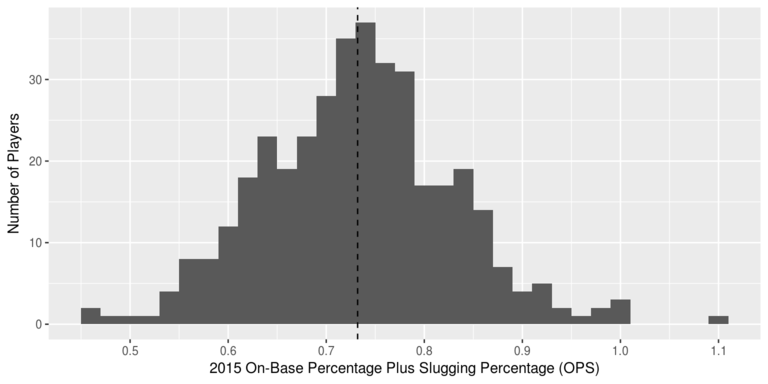
Distribution of the 2015 “on-base plus slugging” (OPS) values for Major League Baseball position players with 130 or more at-bats. (Click for higher-resolution version.) The dashed line shows the average OPS for all such players.
tl;dr: How America’s pastime illustrates the tensions and trade-offs between liberty and equality.
In this post in my series outlining my answers to the “Seven Questions” posed by Jason Booms, I address Jason’s fourth question:
Thinking about the principles of liberty and equality, and this can apply to any given challenge (fiscal, social, etc…), how can they both be promoted to ensure that the “unalienable rights” of all Americans are protected?
What does it mean to be “free” or “at liberty”? What does it mean to be ”equal”?
Suppose someone tells you, “When I retire next year I’ll be free to travel the world.” In what senses are they using the word “free”? The most basic sense is that they are free from coercion: no one, including the government, is going to physically stop them from leaving the country and visiting others.
The next sense is liberty as individualism: they are not bound by social and familial obligations or restrictions that might otherwise keep them at home. They can live their life as they choose.
A third (but not necessarily final) sense is liberty as “capability”: they are healthy enough to travel, any disabilities they might have can be accomodated, and they have money to pay their way.
What about equality? One sense would consider us all equal in our in-born potential: that each of us could accomplish anything given sufficient will, opportunity, and support. We could be equal in a political sense, as in the preamble to the Declaration of Independence. We could be morally equal in the sight of God, as the apostle Paul wrote in Galatians 3:28. Finally, we could be equal in the rewards that accrue to us in our life and work.
My primary concern here is with freedom as capability, with the first and last senses of equality—to what extent are we equal in our abilities, and to what extent should we receive equal rewards—and how those connect with our political equality. To make the discussion more concrete, let’s talk about baseball.
One way in which we are not all created equal
Major League Baseball players are a rare breed: they’ve proven their ability to play in the major leagues and have the benefit of all the training and other support that their well-financed teams can provide. From a naïve point of view we’d therefore expect them all to demonstrate equal skills and ability.
This is not the case. As shown in the graph above, when measured by one common baseball statistic, the ability to get on base and hit for extra bases, Major League Baseball players show a wide range of performance, with the best players achieving at a level better than twice that of the worst.
More specifically the players’ performance roughly follows a so-called Gaussian distribution, with most players performing at an average or near-average level, some players performing significantly better than average, and some players performing significantly worse.
Gaussian distributions tend to arise when there are many factors influencing a certain measure, with each factor having a relatively small effect and being relatively independent of other factors. For example, when it comes to the ability to get on base and hit for power we can look to factors such as excellent eyesight, quick reaction time, good “hitting mechanics,” and so on.
Many other measures of personal characteristics follow a Gaussian distribution, including measures that are economically important. Thus we’d expect that people in general would differ in their ability to exercise the many competencies that various employers value: some would do a great job, some a poor job, and most a mediocre one.
It’s unlikely that a typical sandlot ballplayer could become a major league player, even given every opportunity and assistance possible. Similarly it’s unlikely that any given person could perform at a high level in every possible job, even if they were intensively trained from early childhood. Discussion of balancing liberty and equality must start with that fundamental premise.
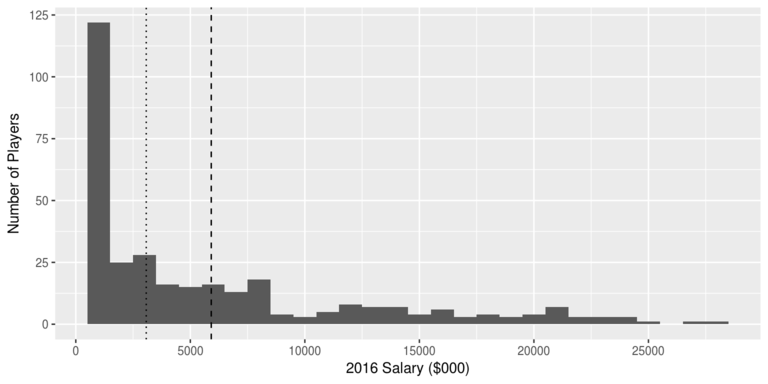
Distribution of the 2016 salaries of the Major League Baseball players whose 2015 OPS statistics are shown in the previous graph. (Click for higher-resolution version.) The dashed line shows the average salary for all such players, the dotted line the median salary.
How liberty magnifies inequalities
Back to baseball. We’ve seen that players’ abilities span a fairly wide range even in the major leagues, and in at least this case seem to be distributed in an approximately-Gaussian manner. We’d therefore naïvely expect that how much players were paid would follow a similar pattern, with most receiving an average salary, some significantly higher salaries, and some significantly lower salaries.
Again, this is not the case. Instead the distribution of salaries more closely resembles a Pareto distribution or “80-20” rule: most players have relatively low salaries and a few players have relatively high salaries. Looking at the same group of players as in the first graph, there is more than a 2-to-1 difference in performance as measured by OPS, but more than a 50-to-1 difference in pay. Why should this be so?
An important reason is that players are ultimately judged on helping their team win, and a relatively small edge in performance can result in a team winning rather than losing. These relatively small differences in performance will then be magnified into relatively large differences in compensation, resulting in a small group of highly-paid superstars separated by a relatively wide gulf from the mass of journeyman players.
The economist Robert Frank referred to this as the “winner-take-all” effect, “the result . . . of the spread of markets in which the value of production depends primarily on the efforts of only a handful of top players who are paid accordingly.”
Winner-take-all dynamics arise relatively easily in economies in which free trade and global communications allow companies to serve a larger market, thus increasing the returns from hiring top talents, and in which top talents are in turn free to move from firm to firm in pursuit of higher compensation. Thus increased (economic) freedom leads to increased (economic) inequality, above and beyond what we might expect simply from the distribution of peoples’ abilities and performance.
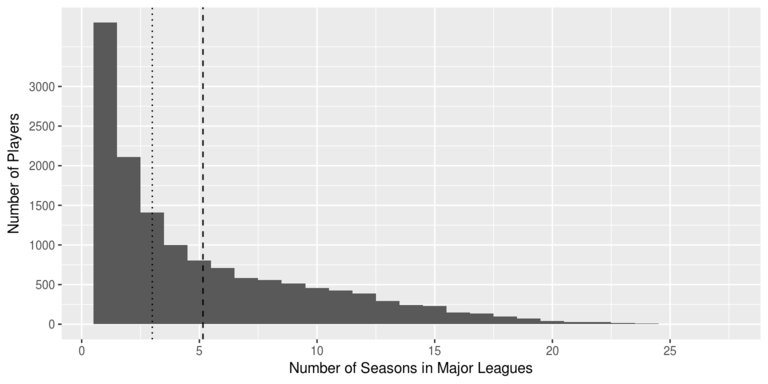
Distribution of the number of major league seasons played by all players whose careers fell within the period from 1901 through 2010. (Click for higher-resolution version.) The dashed line shows the average number of seasons played, the dotted line the median number of seasons.
Inequality and the uncertainties of life
The disparity between journeymen players and superstars, wide as it is, is but one aspect of inequality in Major League Baseball. Further inequality arises because players have major league careers of different lengths, with many players’ careers cut short due to injuries, age-related declines in skills, or simply being marginal players more susceptible to being released.
As shown in the graph above, most players have relatively short careers. Given two players of equivalent skills, the player with the longer career will have greater lifetime earnings, especially if they play long enough to become free agents and enter into more lucrative contracts.
The minimum salary in Major League Baseball is quite high compared that of the typical employee. However, if a player spends only a short time in the major leagues and then has limited employment prospects after leaving baseball, their lifetime earnings may be no greater than those of a middle-class worker with a steady job and a good salary.
Of course, the traditional “steady job with a good salary” can be hard to find nowadays for many if not most people, with wages for many people stagnant and part-time or contingent employment increasingly common even for people who’d like to work full-time.
Just as in baseball, this dynamic further increases inequality, particularly wealth inequality: people who make less or have unexpected expenses (e.g., due to ill health) are less able to save and have less opportunity to acquire assets such as a house, stocks, or bonds that can provide compounding of wealth over time.
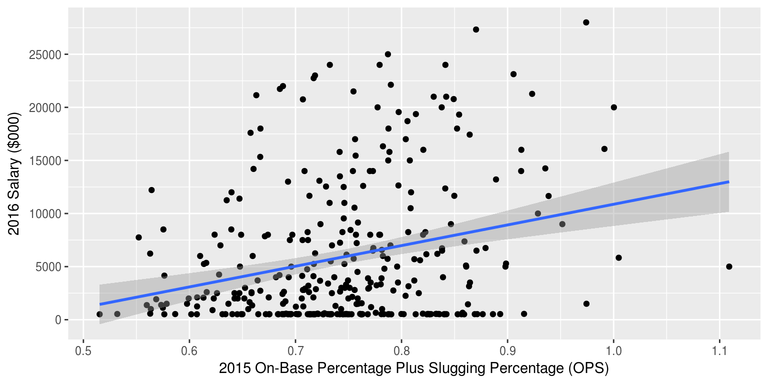
2016 salaries vs. 2015 OPS for Major League Baseball position players with 130 or more at-bats in 2015. (Click for higher-resolution version.) The line shows the result of doing a linear regression of 2016 salary on 2015 OPS, with variation of OPS explaining very little of the variation in salary.
The politics of liberty and equality
Thus in baseball as in life, individual differences in ability and performance are magnified into large differences in compensation, and these in turn combine with the random events of life to cause even large differences in overall wealth. But someone might reply, “Is this really a problem? And if it is, can we solve it without unduly restricting peoples’ liberty?”
For example, one argument is that peoples’ compensation is merely a reflection of the added value they provide to those who pay them, their so-called “marginal product.” Such compensation is therefore deserved, and to interfere in compensation arrangements erodes the incentives provided by a free market.
If this were the case then we should see salaries in baseball track reasonably closely with statistics that attempt to measure a player’s value to a team. But this is not necessarily the case: as shown in the graph above, a player’s salary is only loosely related to the particular measure of performance that is OPS.
Long-term contracts account for part of this, since they uncouple present pay from immediate past performance to some extent. It’s also possible to use more sophisticated measures of baseball performance to determine compensation, for example “wins above replacement” or WAR. Yet arguments still rage over whether some players are significantly undercompensated relative to their performance, and others significantly overcompensated.
The situation is even worse outside baseball, where in a large firm it is often not clear at all how much value a particular employee is adding to the firm’s bottom line, especially for general corporate support functions. This makes it difficult to judge whether any particular person “deserves” what they are paid.
A related argument is that as long as compensation is the result of voluntary agreements freely entered into, any attempt to change the resulting distribution of income and wealth is an unwarranted restriction on liberty.
But is baseball compensation really the result of an unrestricted market free of any political considerations? The short answer is no. First, Major League Baseball is the unique beneficiary of an exemption from US antitrust law that allows MLB team owners to collude in ways that would be considered illegal restraint of trade in other industries. Second, not-so-uniquely Major League Baseball players are organized into a union, an activity permitted and protected by relevant labor laws and overseen by the Federal government.
Thus salaries are not based purely on free-market considerations but rather are in large part the result of negotiations between team owners and players considered collectively. This is a struggle into which questions of fairness and justice almost inevitably intrude, which is subject to government interference on behalf of either side, and thus which can be characterized as political as well as economic.
This is true in the wider economy as well: the economic rewards that each person receives are a function not just of their talents but of the political, social, and economic system in which people exercise those talents. The entire system can then be judged on well it performs for those who participate in it.
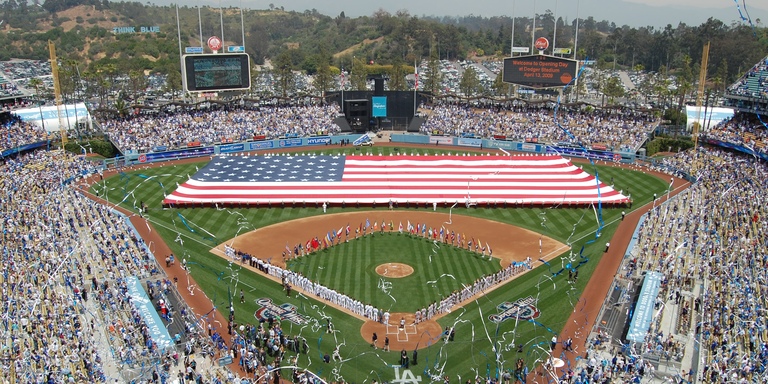
Fans of the Los Angeles Dodgers celebrate the opening day of the 2009 season at Dodger Stadium. (Click for higher-resolution version.) Image © 2009 by Andy Browncoat, used under the terms of the Creative Commons Attribution-Share Alike 2.0 Generic license.
Pursuing democratic equality
Where does that leave us? First, it’s clear that the freedom that people enjoy has increased greatly compared to the past, even if many still do not enjoy it to the same degree as others: Liberal democracies have greatly lessened the burden of government coercion; evolving social mores mean people are less subject to social strictures; and science, technology, and the free market have made necessities of life like food, clothes, and transportation more affordable—while making it easier than ever to satisfy what we desire beyond the bare necessities.
At the same time it’s also clear that an inherently unequal distribution of talents and other non-monetary assets is further magnified by the free-market system. This in turn lessens the extent to which many enjoy freedom in the sense of capability, even though economic freedom and individualism may be greater than ever before.
Given that, what (if anything) should we do about it? And how should we justify any policies we adopt? I’ll address the latter question first, since the justifications for addressing inequalities help determine the means by which we might do so.
This question is often reduced to a binary opposition between ensuring equality of opportunity vs. equality of outcome. This is both simplistic and unrealistic. Ensuring equality of opportunity is certainly consistent with promoting freedom as noncoercion and freedom as individualism. However given inequalities of talent and the dynamics of a free market system in magnifying those inequalities, it cannot in and of itself promote freedom as capability.
On the other hand, ensuring true equality of outcomes is difficult to impossible. Even in a system not organized around free markets natural differences in talent and other personal characteristics would lead to inequalities in outcomes, inequalities that history shows us could be rectified only at the expense of severely limiting freedom.
That might seem to leave only a practical justification for reducing inequalities, such as that recently offered by Samuel Hammond and others: that providing a generous system of social insurance is the best way to bolster support for the free market and stave off the growth of anti-market populism. This seems plausible, but as a justification it has a “bread and circuses” flavor to it, implying as it does that equality matters only as a way of promoting political peace.
I prefer philosopher Elizabeth Anderson’s conception of what she calls “democratic equality,” which focuses on freedom from domination and our relationship to our fellow citizens: that “people are entitled to whatever capabilities are necessary to enable them to avoid or escape entanglements in oppressive social relationships . . . and to the capabilities necessary for functioning as an equal citizen in a democratic state.”
People can meet each other in equality as fellow fans of a team, whether they sit in the luxury boxes or in the cheap seats (or watch from home). The ideal of democratic equality is for people to be able to similarly meet each other in equality as fellow citizens, even if their personal circumstances are very different. What must happen for them to be able to do this?
First, it helps if there exist opportunities for everyone to be a productive member of society and to seek excellence in their own way. This is one of the benefits of a free-market economy: that entrepreneurial innovation can create not just new jobs, but different kinds of jobs. Had basketball not been invented and baseball been the only professional sport, we might know Michael Jordan (if we knew him at all) only as a better-than-average minor league player. Similarly a dynamic free-market economy provides spaces for all sorts of talents, especially when it helps support a vibrant civil society.
Second, there must be a level of subsistence below which people cannot fall, and as much as possible a minimum return for the work they perform. Baseball’s minimum salary for new players means that everyone who advances to the major leagues starts out in roughly the same position, and ensures that the intense competition between players eager to join an MLB team does not leave them vulnerable to owners eager to squeeze payrolls as much as possible. Minimum wages in other contexts, as well as related schemes like wage subsidization, can function similarly, providing benefits for workers sufficient to compensate for the downsides (e.g., higher prices to others).
Third, people should be buffered to some extent from the unforeseeable events of life. Long-term contracts in baseball not only allow team owners to retain stars and likely stars, they also provide players a reasonably guaranteed return on their work regardless of what might happen in the future. Similarly schemes like government-provided universal catastrophic coverage can help ensure that people and their families do not suffer financial ruination due to ill health, but can instead plan for the future knowing that their health care costs will never exceed an undue percentage of their income.
The support given to people in support of democratic equality is to enable them to participate in democratic life with others. It should therefore be provided to everyone as a matter of course, like Social Security or Medicare, and not be means-tested. This avoids singling out some among us as the objects of our charity and pity—and thereby risking their in turn becoming the objects of resentment.
It’s also desirable that such programs be funded at least in part by sources that are in some sense “owned” by all of us or stand apart from us. One example at the state level is the Alaska Permanent Fund, which issues “dividends” to Alaskans based on their perceived common interest in the state’s oil resources. Similar assets at the national level include rights to public lands or portions of the electromagnetic spectrum auctioned off to telecommunications companies for their use. This again helps avoid characterization of social insurance programs as simply forced redistribution from “makers” to “takers.”
In this vein, recall that the idea of democratic equality involves making it possible for us to stand before each other equally as fellow citizens. But pursuing democratic equality for all citizens does not necessarily require pursuing it for anyone else. It’s not unreasonable for Americans to believe that they owe more to those who are their fellow citizens than to those who are not.
We can and should welcome those who want to become Americans, but at the same time we can justify withholding the full benefits of being a citizen until they complete their own paths to citizenship. Until that time the taxes they pay could be dedicated to help fund universal social insurance schemes for those who are already citizens.
Suppose that we agree that achieving the democratic equality of all American citizens is a worthy goal. Suppose also that we have some idea of what measures might best promote this. What’s stopping us from implementing them? The problem is that these measures require that we take collective action via government, and the ongoing influence of individualism and group identity politics (of all flavors) have impacted our ability to take such actions.
As I write in my next post, this deficit of collective will may continue for the foreseeable future. But there may come a time when we can adapt the words of Paul to our contemporary situation, and say that as citizens there is no longer white or black, there is no longer rich or poor, there is no longer red state or blue state, for all of us are equal as Americans.
Further exploration
The following provide additional background for and expansions of the topics discussed in this post:
- “Talent and the Winner-Take-All Society” by Robert Frank discusses the phenomenon of increased inequality in free-market economies due to “winner-take-all” dynamics. (See also Frank’s and Philip Cook’s book The Winner-Take-All Society: Why the Few at the Top Get So Much More Than the Rest of Us.)
- “What is the point of equality?” (ungated version [PDF]) by Elizabeth Anderson criticizes “luck egalitarianism” and lays out her alternative vision of “democratic equality.” (See in particular pages 316-321 and the conclusion on pages 336-337.)
- “Common Property: How Social Insurance Became Confused with Socialism” is a popular article by Anderson that touches on many of the same themes, including a look back to Thomas Paine and his social insurance proposal.
- “The free-market welfare state: Preserving dynamism in a volatile world” by Samuel Hammond of the Niskanen Center proposes a strengthened welfare state as the best approach to maintaining a free-market system. (See also the Twitter thread announcing the paper and the Washington Post interview of Hammond discussing his views.)
- “A Health Care Plan That’s Universal and Bipartisan” by Ed Dolan (also of the Niskanen Center) outlines one approach to ensuring that all Americans can cope with the costs of health care.
Finally, for the calculations and data behind the graphs above, see “Baseball salaries vs. performance” and the source code for that article in the seven-answers code repository.